Alapadatok
Év, oldalszám:2017, 5 oldal
Nyelv:angol
Letöltések száma:1
Feltöltve:2023. június 08.
Méret:1 MB
Intézmény:
-
Megjegyzés:
The Texas Department of Motor Vehicles Smart Buyer Series
Csatolmány:-
Letöltés PDF-ben:Kérlek jelentkezz be!
Értékelések
Nincs még értékelés. Legyél Te az első!
Legnépszerűbb doksik ebben a kategóriában
Tartalmi kivonat
The Texas Department of Motor Vehicles Smart Buyer Series New Cars Smart Buyer – Tips for Buying a New Car Overview Purchasing a new motor vehicle will be one of the largest purchases you will ever make. The Texas Department of Motor Vehicles (TxDMV) is dedicated to helping consumers make informed decisions when buying a motor vehicle. TxDMV wants you to be a “Smart Buyer” The following basics should be considered before buying a new car or truck: Do your homework first! Check your finances Shop for the best loan Check the book value of the new car Research local dealers Learn what sales terms mean Inspect the vehicle carefully Negotiate the price and confirm it in writing Understand the warranty Check the dealer’s service department Be careful about aftermarket add-ons Tips for Purchasing a New Vehicle Do Your Homework First! Check the history, reliability and safety of the models of motor vehicles you are interested in
purchasing. Websites such as Consumer Reports, Edmunds, or safercar.gov are great sources of information on new cars Check Your Finances To See How Much Car You Can Afford Have a realistic idea on how much you can afford to pay for your new car before you start shopping. If you are mathematically challenged, try the Auto Loan Calculator found at Kelley Blue Book. Your bank or credit union may also help you with finding the price you can afford. Many sources will say you should not spend more than 20% of your monthly take-home pay on a car payment. Know your price range before you get to the car lot! There Are Two Contracts It is important to understand that, except if you are paying cash for the new car, all car purchases involve two contracts. One contract is the car purchase or sales agreement where you contract with the dealer to purchase the vehicle. The second contract is the finance agreement or retail installment loan agreement This is, in many cases, a contract with someone
other than the dealer. It is a contract with a bank, a credit union or finance TEXAS DEPARTMENT OF MOTOR VEHICLES SEPTEMBER 2017 1 company. You make a promise to make monthly payments, which usually include interest, in exchange for the lender’s promise to pay an amount of money to the dealer on your behalf. As part of the contract with the lender, in addition to your promise to make regular monthly payments, you will be agreeing to keep the car fully insured and maintained. You may also be required to promise to not take the car out of the country without the lender’s knowledge or approval. These promises by you are to protect the collateral you have pledged to get the money to pay the dealer. The retail installment agreement will also have provisions for when you breach or violate the contract. For instance, the lender will usually to able to insure the vehicle if you do not maintain the full coverage you promised to keep in force. The retail installment agreement will also
allow the lender to repossess the vehicle if you fail to make payments. Make sure you understand all parts of the lending documents! For more information on retail installment agreements or to file a complaint against a lender contact the Office of Consumer Credit Commissioner. If Needed, Shop Around For the Best Loan Sometimes you can find better loan rates from banks and credit unions than at your local dealer. Shop for the best deal, comparing the annual percentage rate (APR) and the length of the loan. When negotiating to finance a car, be wary of focusing only on the monthly payment. The total amount you will pay depends on the price of the car, the APR, and the length of the loan. Check the Book Value of the Model(s) of the New Car It is just as important to know how much a new car is worth as it is to know how much you can afford. Knowing a new car’s book value is a helpful tool when negotiating price with a dealer. Check sites like Kelley Blue Book, Edmunds, the National
Automotive Dealers Association, or TrueCar to obtain a realistic price for the vehicle and to help you determine whether you are getting a fair offer. Use the Internet to help you compare prices It may be that prices from dealers in another city may be lower than the prices offered by dealers in your city. If you have a trade-in vehicle, find out how much that used vehicle is worth using sources on the Internet, such as Kelly’s Blue Book and Edmunds. Check local and national advertisements to determine for what amount other sellers are selling your trade-in. Discuss the possibility of a trade-in with the dealer only after you have negotiated the best possible price for your new car, and only after you have researched the value of your trade-in. If you cannot get fair trade-in value for your old car, consider selling it privately. Research Local Dealers There are thousands of dealers in Texas. The sheer number makes it difficult to know which dealer to choose Check with the Better
Business Bureau, or the Texas Attorney General Office for useful information on the complaint history of a particular dealer. Friends and family or a trusted mechanic are also good sources for a referral to a reputable dealer. Learn What Sales Terms Mean There are many different terms that you will see or hear when purchasing a new car. Understanding these terms can help you better understand the car buying process and negotiate the best deal. • Invoice Price is the manufacturer’s initial charge to the dealer. Understand that this is sometimes higher than what the dealer actually paid for the vehicle because dealers receive rebates, allowances, discounts, and incentive awards. Generally, the invoice price should include freight (also known as destination and delivery). If you’re buying a car based on the invoice price (for example, “at invoice,” “$100 below invoice,” “two percent above invoice”) and if freight is already included, make sure freight is not added again
to TEXAS DEPARTMENT OF MOTOR VEHICLES SEPTEMBER 2017 2 • • • the sales contract. PRO Note: Because of the difficulty in defining or determine what actually is “the invoice” for a vehicle, it is illegal in Texas for a dealer to advertise an invoice price for a motor vehicle. Base Price is the cost of the car without options, but includes standard equipment and factory warranty. This price is printed on the Monroney sticker, which, by federal law must be displayed on the vehicle until the first retail sale. Monroney Sticker Price (MSRP) is a total of the manufacturer’s or distributor’s installed options with the suggested retail price and the manufacturer’s transportation charge. The Monroney label will also show the fuel economy estimates (mileage) for the vehicle. Dealer Sticker Price, commonly a supplemental sticker, is the Monroney sticker price plus the suggested retail price of dealer-installed options, such as additional dealer markup (ADM) or additional
dealer profit (ADP), dealer preparation, and undercoating and any other item the dealer may have added to the vehicle after it was delivered by the manufacturer. Inspect the Vehicle Carefully Once you decide on the model of car and the dealer, take great care to inspect the new car. If you have followed the tips above, you have done your research on the vehicle pricing, reliability and safety. With that information in hand, check the vehicle interior and exterior to ensure that everything operates as expected and these is no existing damage to the vehicle. Always test-drive the vehicle to see and feel how the car performs in normal driving conditions. When doing the test drive, check the odometer Negotiate the Vehicle Price and Confirm It in Writing If you have done your research, you will know the range of price for the vehicle model you have targeted for purchase. You will also know how much you can afford to pay Plan to negotiate on price Since the vehicle price is a factor in the
dealer’s calculations regardless of whether you pay cash or finance your car and also affects your monthly payments negotiating the price can save you money. Dealers may be willing to bargain on their profit margin. Usually, this is the difference between the manufacturer’s suggested retail price (MSRP) and the invoice price. If you do not see what you want to buy on the dealer‘s lot, do not feel pressured to take what the salesman is offering. Consider ordering your new car if you don’t see exactly what you want on the lot This may involve a delay, but cars on the lot may have options you don’t want and that can raise the price. However, dealers often want to sell their current inventory quickly, so you may be able to negotiate a better deal if an in-stock car meets your needs. Sometimes, dealers may offer very low financing rates for specific cars or models, but may not be willing to negotiate on the price of these cars. To qualify for the special rates, you may be
required to make a large down payment. With these conditions, you may find that it’s sometimes more affordable to pay higher financing charges on a car that is lower in price, or to buy a car that requires a smaller down payment. Before you sign a contract to purchase or finance the car, consider the terms of the financing and evaluate whether it is affordable. Make certain the purchase agreement reflects your understanding of the entire deal before you sign. Understand or ask questions about every item that goes into the bottom line price Before you drive off the lot, be sure to have a copy of the contract and all other documents that you and the dealer have signed. Be sure that all blanks are filled in. TEXAS DEPARTMENT OF MOTOR VEHICLES SEPTEMBER 2017 3 Some dealers and lenders may ask you to buy credit insurance to pay off your loan if you should die or become disabled. These insurance products are called credit life insurance and credit disability insurance Before you buy
credit insurance, consider the cost, and whether it is prudent for you. Check your existing policies to avoid duplicating benefits. Credit insurance is not required by federal law If you decide to buy credit insurance, it must be included in the cost of credit. That is, it must be reflected in the retail installment agreement Check with the Office of Texas Attorney General, the Office of Consumer Credit Commissioner, and the Texas Department of Insurance for more information about credit insurance. Understand the Warranty The warranty is a written guarantee by the manufacturer of the vehicle that is issued to the purchaser promising to repair or replace certain items on the vehicle, if necessary, within a specified period of time or miles. If you have done your research, you are already familiar with the record of dependability for your vehicle you are seeking to purchase. No vehicle is perfect and sometimes parts do not function or perform as promised Read your owner’s manual and
understand the warranty. If you have a question about the warranty, ask immediately Know what components are covered. Take care to not violate the terms of the warranty, which could end up voiding the warranty. If you have a recurring problem with the operation of your new motor vehicle, you may have certain rights under the Texas Lemon Law. Further information on the law and eligibility for lemon law relief can be found on the department’s website at http://www.txdmvgov/motorists/consumer-protection/lemon-law Check the Dealer’s Service Department Buying your new car is simply the first step. Maintaining the vehicle is critical Vehicle service is a relationship that you can have with a dealer that will last for years. Thus, examining the service department and how it conducts itself when servicing a new vehicle is just as important as the model of new car you buy. Look for reviews on-line. Be Careful of Aftermarket Add-Ons When you have decided to buy your new car, you will be
brought into the finance office to work on the paperwork associated with the purchase. This is when certain extra options may be offered for sale to add to your contract price. Add-ons like credit insurance, GAP insurance (covers the difference between the value of the vehicle and the outstanding auto loan amount), rustproofing or customized paint or tinting, or extended service contracts. Some (or all) of these items may seem attractive. If you do not understand the offer and price, ask questions! Considering a Service Contract Service contracts that you may buy with a new car provide for the repair of certain parts or problems. These contracts are offered by manufacturers, dealers, or independent companies and may or may not provide coverage beyond the manufacturer’s warranty. Remember that a warranty is included in the price of the car while a service contract will have a separate additional charge. Always research the extend service provider, if it is not the dealer or the
manufacturer. More information on extended service companies can be provided by the Texas Department of Licensing and Regulation, the agency that regulates this industry. Before deciding to purchase a service contract, read it carefully and consider these questions: TEXAS DEPARTMENT OF MOTOR VEHICLES SEPTEMBER 2017 4 • • • • • • • What’s the difference between the coverage under the warranty and the coverage under the service contract? What repairs are covered? Is routine maintenance covered? Who pays for the labor? The parts? Who performs the repairs? Can repairs be made elsewhere? How long does the service contract last? What are the cancellation and refund policies? Contact Us TxDMV Enforcement Division P.O Box 2063 Austin, Texas 78768-2063 512-465-3025 888-368-4689 www.TxDMVgov enforcement@txdmv.gov Please see other topics in the “Smart Buyer” series to help you make the best decision possible. The staff that developed “Smart Buyer” series is always
interested in new ideas or tips that will make this tool more useful for consumers. If you have a suggestion on how to make this “Smart Buyer” or any of the other “Smart Buyer” topic more helpful for consumers, please send your suggestion to our general mailbox at enforcement@txdmv.gov TEXAS DEPARTMENT OF MOTOR VEHICLES SEPTEMBER 2017 5
purchasing. Websites such as Consumer Reports, Edmunds, or safercar.gov are great sources of information on new cars Check Your Finances To See How Much Car You Can Afford Have a realistic idea on how much you can afford to pay for your new car before you start shopping. If you are mathematically challenged, try the Auto Loan Calculator found at Kelley Blue Book. Your bank or credit union may also help you with finding the price you can afford. Many sources will say you should not spend more than 20% of your monthly take-home pay on a car payment. Know your price range before you get to the car lot! There Are Two Contracts It is important to understand that, except if you are paying cash for the new car, all car purchases involve two contracts. One contract is the car purchase or sales agreement where you contract with the dealer to purchase the vehicle. The second contract is the finance agreement or retail installment loan agreement This is, in many cases, a contract with someone
other than the dealer. It is a contract with a bank, a credit union or finance TEXAS DEPARTMENT OF MOTOR VEHICLES SEPTEMBER 2017 1 company. You make a promise to make monthly payments, which usually include interest, in exchange for the lender’s promise to pay an amount of money to the dealer on your behalf. As part of the contract with the lender, in addition to your promise to make regular monthly payments, you will be agreeing to keep the car fully insured and maintained. You may also be required to promise to not take the car out of the country without the lender’s knowledge or approval. These promises by you are to protect the collateral you have pledged to get the money to pay the dealer. The retail installment agreement will also have provisions for when you breach or violate the contract. For instance, the lender will usually to able to insure the vehicle if you do not maintain the full coverage you promised to keep in force. The retail installment agreement will also
allow the lender to repossess the vehicle if you fail to make payments. Make sure you understand all parts of the lending documents! For more information on retail installment agreements or to file a complaint against a lender contact the Office of Consumer Credit Commissioner. If Needed, Shop Around For the Best Loan Sometimes you can find better loan rates from banks and credit unions than at your local dealer. Shop for the best deal, comparing the annual percentage rate (APR) and the length of the loan. When negotiating to finance a car, be wary of focusing only on the monthly payment. The total amount you will pay depends on the price of the car, the APR, and the length of the loan. Check the Book Value of the Model(s) of the New Car It is just as important to know how much a new car is worth as it is to know how much you can afford. Knowing a new car’s book value is a helpful tool when negotiating price with a dealer. Check sites like Kelley Blue Book, Edmunds, the National
Automotive Dealers Association, or TrueCar to obtain a realistic price for the vehicle and to help you determine whether you are getting a fair offer. Use the Internet to help you compare prices It may be that prices from dealers in another city may be lower than the prices offered by dealers in your city. If you have a trade-in vehicle, find out how much that used vehicle is worth using sources on the Internet, such as Kelly’s Blue Book and Edmunds. Check local and national advertisements to determine for what amount other sellers are selling your trade-in. Discuss the possibility of a trade-in with the dealer only after you have negotiated the best possible price for your new car, and only after you have researched the value of your trade-in. If you cannot get fair trade-in value for your old car, consider selling it privately. Research Local Dealers There are thousands of dealers in Texas. The sheer number makes it difficult to know which dealer to choose Check with the Better
Business Bureau, or the Texas Attorney General Office for useful information on the complaint history of a particular dealer. Friends and family or a trusted mechanic are also good sources for a referral to a reputable dealer. Learn What Sales Terms Mean There are many different terms that you will see or hear when purchasing a new car. Understanding these terms can help you better understand the car buying process and negotiate the best deal. • Invoice Price is the manufacturer’s initial charge to the dealer. Understand that this is sometimes higher than what the dealer actually paid for the vehicle because dealers receive rebates, allowances, discounts, and incentive awards. Generally, the invoice price should include freight (also known as destination and delivery). If you’re buying a car based on the invoice price (for example, “at invoice,” “$100 below invoice,” “two percent above invoice”) and if freight is already included, make sure freight is not added again
to TEXAS DEPARTMENT OF MOTOR VEHICLES SEPTEMBER 2017 2 • • • the sales contract. PRO Note: Because of the difficulty in defining or determine what actually is “the invoice” for a vehicle, it is illegal in Texas for a dealer to advertise an invoice price for a motor vehicle. Base Price is the cost of the car without options, but includes standard equipment and factory warranty. This price is printed on the Monroney sticker, which, by federal law must be displayed on the vehicle until the first retail sale. Monroney Sticker Price (MSRP) is a total of the manufacturer’s or distributor’s installed options with the suggested retail price and the manufacturer’s transportation charge. The Monroney label will also show the fuel economy estimates (mileage) for the vehicle. Dealer Sticker Price, commonly a supplemental sticker, is the Monroney sticker price plus the suggested retail price of dealer-installed options, such as additional dealer markup (ADM) or additional
dealer profit (ADP), dealer preparation, and undercoating and any other item the dealer may have added to the vehicle after it was delivered by the manufacturer. Inspect the Vehicle Carefully Once you decide on the model of car and the dealer, take great care to inspect the new car. If you have followed the tips above, you have done your research on the vehicle pricing, reliability and safety. With that information in hand, check the vehicle interior and exterior to ensure that everything operates as expected and these is no existing damage to the vehicle. Always test-drive the vehicle to see and feel how the car performs in normal driving conditions. When doing the test drive, check the odometer Negotiate the Vehicle Price and Confirm It in Writing If you have done your research, you will know the range of price for the vehicle model you have targeted for purchase. You will also know how much you can afford to pay Plan to negotiate on price Since the vehicle price is a factor in the
dealer’s calculations regardless of whether you pay cash or finance your car and also affects your monthly payments negotiating the price can save you money. Dealers may be willing to bargain on their profit margin. Usually, this is the difference between the manufacturer’s suggested retail price (MSRP) and the invoice price. If you do not see what you want to buy on the dealer‘s lot, do not feel pressured to take what the salesman is offering. Consider ordering your new car if you don’t see exactly what you want on the lot This may involve a delay, but cars on the lot may have options you don’t want and that can raise the price. However, dealers often want to sell their current inventory quickly, so you may be able to negotiate a better deal if an in-stock car meets your needs. Sometimes, dealers may offer very low financing rates for specific cars or models, but may not be willing to negotiate on the price of these cars. To qualify for the special rates, you may be
required to make a large down payment. With these conditions, you may find that it’s sometimes more affordable to pay higher financing charges on a car that is lower in price, or to buy a car that requires a smaller down payment. Before you sign a contract to purchase or finance the car, consider the terms of the financing and evaluate whether it is affordable. Make certain the purchase agreement reflects your understanding of the entire deal before you sign. Understand or ask questions about every item that goes into the bottom line price Before you drive off the lot, be sure to have a copy of the contract and all other documents that you and the dealer have signed. Be sure that all blanks are filled in. TEXAS DEPARTMENT OF MOTOR VEHICLES SEPTEMBER 2017 3 Some dealers and lenders may ask you to buy credit insurance to pay off your loan if you should die or become disabled. These insurance products are called credit life insurance and credit disability insurance Before you buy
credit insurance, consider the cost, and whether it is prudent for you. Check your existing policies to avoid duplicating benefits. Credit insurance is not required by federal law If you decide to buy credit insurance, it must be included in the cost of credit. That is, it must be reflected in the retail installment agreement Check with the Office of Texas Attorney General, the Office of Consumer Credit Commissioner, and the Texas Department of Insurance for more information about credit insurance. Understand the Warranty The warranty is a written guarantee by the manufacturer of the vehicle that is issued to the purchaser promising to repair or replace certain items on the vehicle, if necessary, within a specified period of time or miles. If you have done your research, you are already familiar with the record of dependability for your vehicle you are seeking to purchase. No vehicle is perfect and sometimes parts do not function or perform as promised Read your owner’s manual and
understand the warranty. If you have a question about the warranty, ask immediately Know what components are covered. Take care to not violate the terms of the warranty, which could end up voiding the warranty. If you have a recurring problem with the operation of your new motor vehicle, you may have certain rights under the Texas Lemon Law. Further information on the law and eligibility for lemon law relief can be found on the department’s website at http://www.txdmvgov/motorists/consumer-protection/lemon-law Check the Dealer’s Service Department Buying your new car is simply the first step. Maintaining the vehicle is critical Vehicle service is a relationship that you can have with a dealer that will last for years. Thus, examining the service department and how it conducts itself when servicing a new vehicle is just as important as the model of new car you buy. Look for reviews on-line. Be Careful of Aftermarket Add-Ons When you have decided to buy your new car, you will be
brought into the finance office to work on the paperwork associated with the purchase. This is when certain extra options may be offered for sale to add to your contract price. Add-ons like credit insurance, GAP insurance (covers the difference between the value of the vehicle and the outstanding auto loan amount), rustproofing or customized paint or tinting, or extended service contracts. Some (or all) of these items may seem attractive. If you do not understand the offer and price, ask questions! Considering a Service Contract Service contracts that you may buy with a new car provide for the repair of certain parts or problems. These contracts are offered by manufacturers, dealers, or independent companies and may or may not provide coverage beyond the manufacturer’s warranty. Remember that a warranty is included in the price of the car while a service contract will have a separate additional charge. Always research the extend service provider, if it is not the dealer or the
manufacturer. More information on extended service companies can be provided by the Texas Department of Licensing and Regulation, the agency that regulates this industry. Before deciding to purchase a service contract, read it carefully and consider these questions: TEXAS DEPARTMENT OF MOTOR VEHICLES SEPTEMBER 2017 4 • • • • • • • What’s the difference between the coverage under the warranty and the coverage under the service contract? What repairs are covered? Is routine maintenance covered? Who pays for the labor? The parts? Who performs the repairs? Can repairs be made elsewhere? How long does the service contract last? What are the cancellation and refund policies? Contact Us TxDMV Enforcement Division P.O Box 2063 Austin, Texas 78768-2063 512-465-3025 888-368-4689 www.TxDMVgov enforcement@txdmv.gov Please see other topics in the “Smart Buyer” series to help you make the best decision possible. The staff that developed “Smart Buyer” series is always
interested in new ideas or tips that will make this tool more useful for consumers. If you have a suggestion on how to make this “Smart Buyer” or any of the other “Smart Buyer” topic more helpful for consumers, please send your suggestion to our general mailbox at enforcement@txdmv.gov TEXAS DEPARTMENT OF MOTOR VEHICLES SEPTEMBER 2017 5
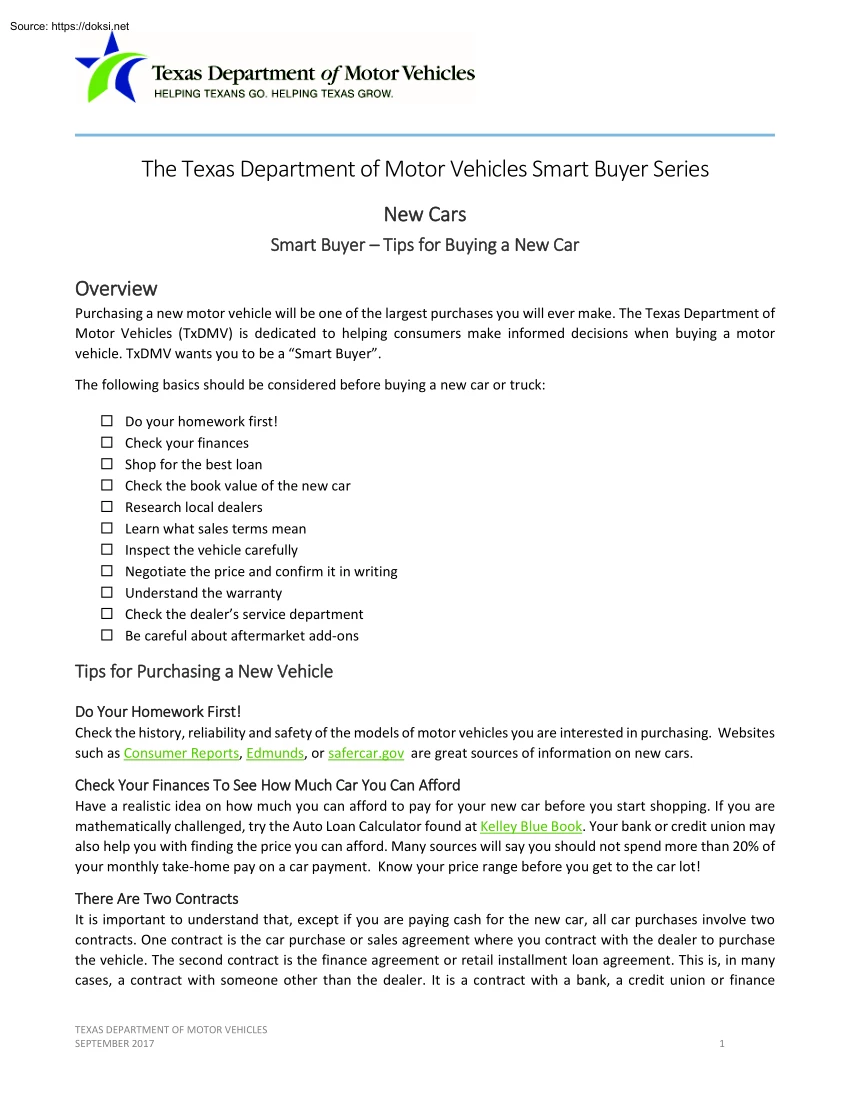
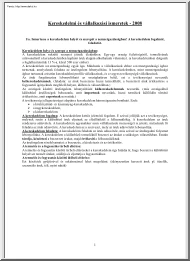
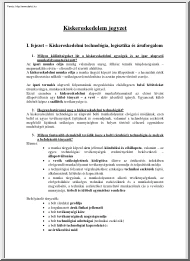
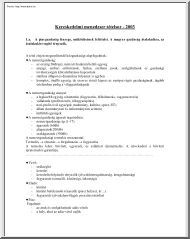
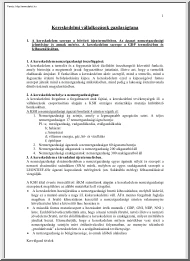
 Módszertani útmutatónkból megtudod, hogyan lehet profi szakdolgozatot készíteni. Foglalkozunk a diplomamunka céljaival, a témaválasztás nehézségeivel, illetve a forrásanyagok kutatásával, szakszerű felhasználásával is. Szót ejtünk a szakdolgozat ideális nyelvezetéről és struktúrájáról és a gyakran elkövetett hibákra is kitérünk.
Módszertani útmutatónkból megtudod, hogyan lehet profi szakdolgozatot készíteni. Foglalkozunk a diplomamunka céljaival, a témaválasztás nehézségeivel, illetve a forrásanyagok kutatásával, szakszerű felhasználásával is. Szót ejtünk a szakdolgozat ideális nyelvezetéről és struktúrájáról és a gyakran elkövetett hibákra is kitérünk.